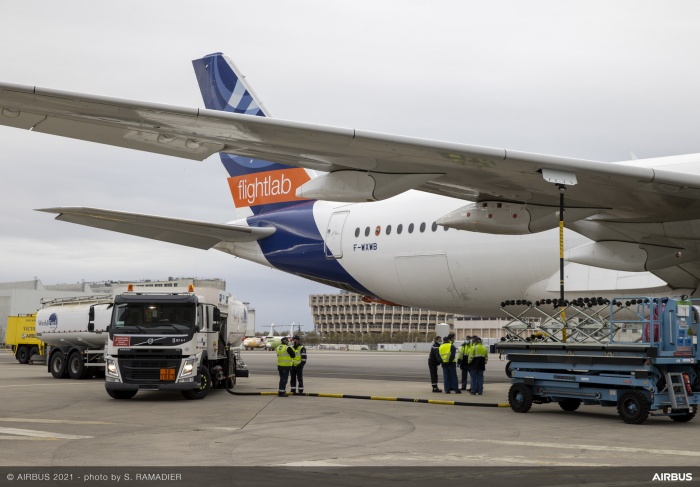A staff of aerospace specialists has launched the primary in-flight emissions research utilizing 100 per cent sustainable aviation gas (SAF) on a wide-body business passenger plane.
Airbus, German analysis centre DLR, Rolls-Royce and SAF producer Neste have teamed as much as begin the pioneering ‘Emission and Local weather Affect of Various Fuels’ (ECLIF3) venture trying into the consequences of SAF on plane emissions and efficiency.
Findings from the research – to be carried out on the bottom and within the air utilizing an Airbus A350-900 plane powered by Rolls-Royce Trent XWB engines – will assist efforts presently underway at Airbus and Rolls-Royce to make sure the aviation sector is prepared for the large-scale use of SAF as a part of the broader initiative to decarbonise the trade.
Gasoline-clearance engine exams, together with a primary flight to verify operational compatibility of utilizing 100 per cent SAF with the plane’s methods, began at Airbus’ services in Toulouse, France, this week.
These will probably be adopted by the ground-breaking flight-emissions exams attributable to begin in April and resuming within the Autumn, utilizing DLR’s Falcon 20-E ‘chase airplane’ to hold out measurements to analyze the emissions affect of utilizing SAF.
In the meantime, additional floor exams measuring particulate-matter emissions are set to point the environmental affect of SAF-use on airport operations.
Each the flight and the bottom exams will evaluate emissions from the usage of 100 per cent SAF produced with HEFA (hydroprocessed esters and fatty acids) expertise towards these from fossil kerosene and low-sulphur fossil kerosene.
The SAF will probably be supplied by Neste, a number one worldwide provider of sustainable aviation gas.
Further measurement and evaluation for the characterisation of the particulate-matter emissions throughout the floor testing will probably be delivered by the UK’s College of Manchester and the Nationwide Analysis Council of Canada.
“SAF is an important a part of Airbus’ ambition to decarbonise the aviation trade and we’re working carefully with various companions to make sure a sustainable future for air journey,” stated Steven Le Moing, new vitality programme supervisor, Airbus.
“Plane can presently solely function utilizing a most 50 per cent mix of SAF and fossil kerosene; this thrilling collaboration won’t solely present perception into how gas-turbine engines operate utilizing 100 per cent SAF with a view to certification, however establish the potential emissions reductions and environmental advantages of utilizing such fuels in flight on a business plane too.”

